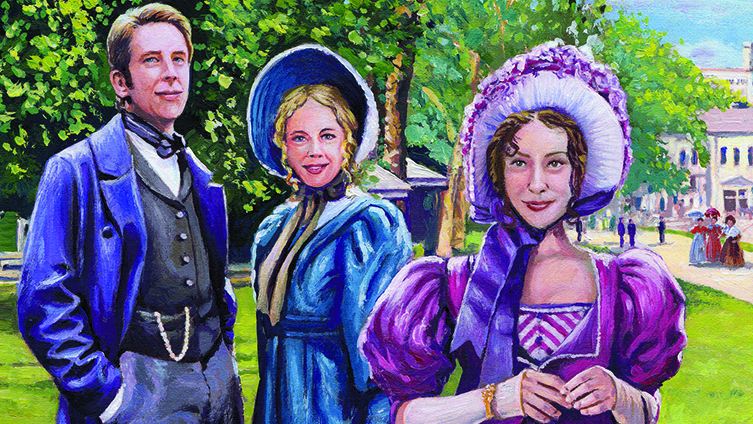On Distant Shores – Episode 31

The last young pupil had trickled out of the First School into the September sunshine, and Maggie moved around the room, stacking primers and slates. She and Margaret had been teaching at the school for nearly a month, ever since Isabel had left for India, and Maggie had enjoyed every moment of it.
Of course, there had been other enjoyments in Boston; her aunt made sure of that. Just two days after Maggie had arrived, Margaret had taken her to a fashionable modiste on Tremont Street and had two day dresses and an evening gown made for her. The following day she’d had Maggie’s uncle, Ian, and his wife, Caroline, for dinner, and thus began a whirl of social engagements that made Maggie’s head spin. Maggie had enjoyed it all, yet hadn’t really felt at home until she’d started at the First School.
Here in the school room she didn’t need to worry about which fork to use or if she was holding her teacup correctly, or if her laugh was too loud. While Aunt Margaret had shown her nothing but warmth and kindness, Maggie didn’t think she was imagining the occasional pursed lips or raised eyebrow her presence in the best drawing- and dining-rooms of Boston caused.
The students at the First School, although poorer, were much like her. She recognised their longing for more, their hope and excitement about all life could offer, as well as the fear of what could be taken away. Whether it was one bad harvest or an injury that kept a young boy or girl from paid work, hunger and destitution were not far away for any of them.
While Margaret taught the older students, Maggie had been given responsibility for the younger ones. She loved gathering them in a circle around her while they read from their primers, loved seeing their faces light up when they sounded out a difficult word or managed to write a complete sentence on their slates.
“We’re expected at the Cavanaghs tonight,” Margaret told her as she finished checking one of the older students’ essays. “So we should be quick about getting home.”
“All right,” Maggie said, trying to hide her reluctance at attending yet another evening event, and Margaret frowned.
“You sound tired, my dear. Perhaps you should stay back from school tomorrow.”
“No,” Maggie said quickly. “I love being at school. I couldn’t miss a day.”
Margaret smiled.
“I’m glad you enjoy the school so.”
The door to the little building opened, sending a shaft of late afternoon sunlight across the wooden floor, and then the shadow of a man. Maggie tensed, and even Margaret stilled, her expression suddenly alert. They had never actually encountered any danger while teaching at the school, but at that moment Maggie was acutely conscious of the fact that the school was on the fringe of Boston’s notorious Murder District.
The man stepped forward and Maggie saw that he was only a little older than herself. He wore the home-spun shirt and trousers of a recent immigrant, and twisted his cap in his hands.
“This is the school?” he asked, his accent distinctly Irish.
Margaret rose from the desk.
“It is.”
“And you teach reading and writing? Anyone who wants it?”
“We do, Mr . . .?” Margaret raised her eyebrows, and for a moment Maggie thought she looked just like the other Bostonian society ladies whose drawing-rooms she’d been paraded through.
“Flanagan, Seamus Flanagan.”













